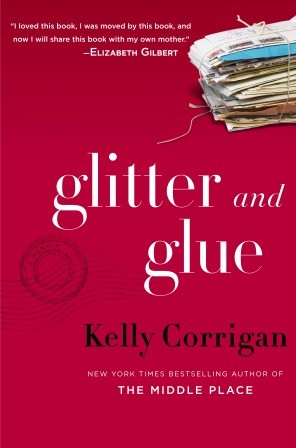
By Kelly Corrigan
(Ballantine Books)
“I know that my mother loves sauerkraut and anchovies and pearl onions,” writes Kelly Corrigan in her third memoir, “Glitter and Glue.” “I know she prefers mashed potatoes from a box, and when she wants to, she can peel an orange in one go. I know she likes her first drink to be vodka ― one full jigger, over ice, with a lemon rind ― and then she downgrades to chardonnay, which she pours into the same glass over the same ice with the same piece of lemon floating on top, one less dish to wash.”
Mothers are characters by nature. We all love to quote Mom’s pet phrases, describe her peeves and peculiarities and recall her ways of doing this and that, whether we religiously follow her example or define ourselves in opposition. The idiosyncrasies converge: reading about Corrigan’s frugal, tough-love Irish-Catholic Philadelphia mother reminded me of the Jersey Jewish one I lost five years ago. In her case, the first drink was Beefeater gin, two fingers, in a Baccarat highball glass, with a capful of vermouth, over ice, three olives, then fill the glass with water. And aren’t you now remembering your mom’s drink, too?
“Glitter and Glue” (“Your father’s the glitter but I’m the glue,” Mary Corrigan told her children) opens in 2012, when the author learns she has an ovarian cyst requiring surgery. When her mother arrives to help, Kelly ― now the mother of two herself ― confesses her greatest fear: that she will wind up like Ellen Tanner, whom she never met, but whose children she cared for.
In 1992, young Kelly was on a world tour with her best friend Tracy Tuttle. They ran out of cash in Sydney, Australia, and got jobs. Kelly was hired as a nanny by John Tanner, whose wife had died of cancer. Five-year-old Martin took immediately to “Keely,” while 7-year-old Milly was stiff and distant.
Kelly’s journal is put to use as she recounts the daily life of this wounded family, her Saturday-night bar tours with Tracy and her reactions while reading Willa Cather’s “My Antonia.” Then, Kelly didn’t get along with her mom as well as she does now, but the experience of surrogate-mothering these bereaved children filled her with appreciation.
“The only mothers who never embarrass, harass, dismiss, discount, deceive, distort, neglect, baffle, appall, inhibit, incite, insult or age poorly are dead mothers ... That’s your consolation prize, Milly Tanner. Your mother will never be caught sunbathing in the driveway in her bra ... or seen slamming the bedroom door in fury. Your mother will always be perfect.”
But that’s actually no consolation at all. What is a consolation is this warm, witty book. (MCT)
-
Articles by Korea Herald



![[AtoZ into Korean mind] Humor in Korea: Navigating the line between what's funny and not](http://res.heraldm.com/phpwas/restmb_idxmake.php?idx=644&simg=/content/image/2024/04/22/20240422050642_0.jpg&u=)
![[Exclusive] Korean military set to ban iPhones over 'security' concerns](http://res.heraldm.com/phpwas/restmb_idxmake.php?idx=644&simg=/content/image/2024/04/23/20240423050599_0.jpg&u=20240423183955)


![[Graphic News] 77% of young Koreans still financially dependent](http://res.heraldm.com/phpwas/restmb_idxmake.php?idx=644&simg=/content/image/2024/04/22/20240422050762_0.gif&u=)
![[Herald Interview] Why Toss invited hackers to penetrate its system](http://res.heraldm.com/phpwas/restmb_idxmake.php?idx=644&simg=/content/image/2024/04/22/20240422050569_0.jpg&u=20240422150649)







![[Exclusive] Korean military to ban iPhones over security issues](http://res.heraldm.com/phpwas/restmb_idxmake.php?idx=652&simg=/content/image/2024/04/23/20240423050599_0.jpg&u=20240423183955)



![[Today’s K-pop] Ateez confirms US tour details](http://res.heraldm.com/phpwas/restmb_idxmake.php?idx=642&simg=/content/image/2024/04/23/20240423050700_0.jpg&u=)